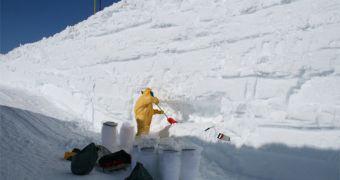Working in the central parts of Antarctica, in an area near the French-Italian CONCORDIA research station, scientists were recently able to discover two small meteorites. The space rocks were encased inside a 55-year-old snowpack that most likely settled down around the middle of the 20th century. Though they are small and may appear insignificant, they may actually hold important clues as to the origins of the solar system, and on how it evolved after the Sun first appeared, Space reports.
In a paper published in the May 7 issue of the esteemed journal Science, researchers say that the two space rocks most likely roamed the solar system for millions of years after they were formed, before they finally breached Earth's atmosphere, and crash-landed in Antarctica. What experts were surprised to find was the fact that the objects were not contaminated, which means that analysis may reveal important new data. Additionally, it was found that two of the samples were actually carrying carbon, a chemical that is highly unusual for this type of structures.
“More than half of their volume is made of a carbon-rich material. This is exceptional because normally if you take a primitive meteorite, the carbon accounts for about a few percent in mass of the whole rock,” explains French Polar Institute Paul Emile Victor collaborator Jean Duprat. The expert, who is based at the Universite Paris-Sud in Orsay, France, was also the leader of the new study. "When we melted this snow and we looked at the particles within this very pure snow, we realized that more than one out of two were extraterrestrial. It was the first time we had such an intrinsically clean collection,” he adds.
Chemical analysis of the objects recovered from the snowpack also revealed the existence of an abnormally-large concentration of the heavy hydrogen isotope deuterium. This may be a clear indicator that the rocky fragments actually separated from a comet, billions of years ago. “What we know is that these particles are most probably from a parent body that did not evolve since very early in the solar system's history, because the composition of these particles is very primitive,” the team leader adds. As such, he believes that the comet roamed the solar system a long time before the planets were formed.
“The very high carbon contents of [the fragments] may well have profound implications for the original delivery of organic molecules to the early Earth, with possible consequences for the earliest prebiotic chemistry,” concludes in an accompanying Science essay Carnegie Institution of Washington expert Larry R. Nittler. He was not directly involved in the investigation.

 14 DAY TRIAL //
14 DAY TRIAL //